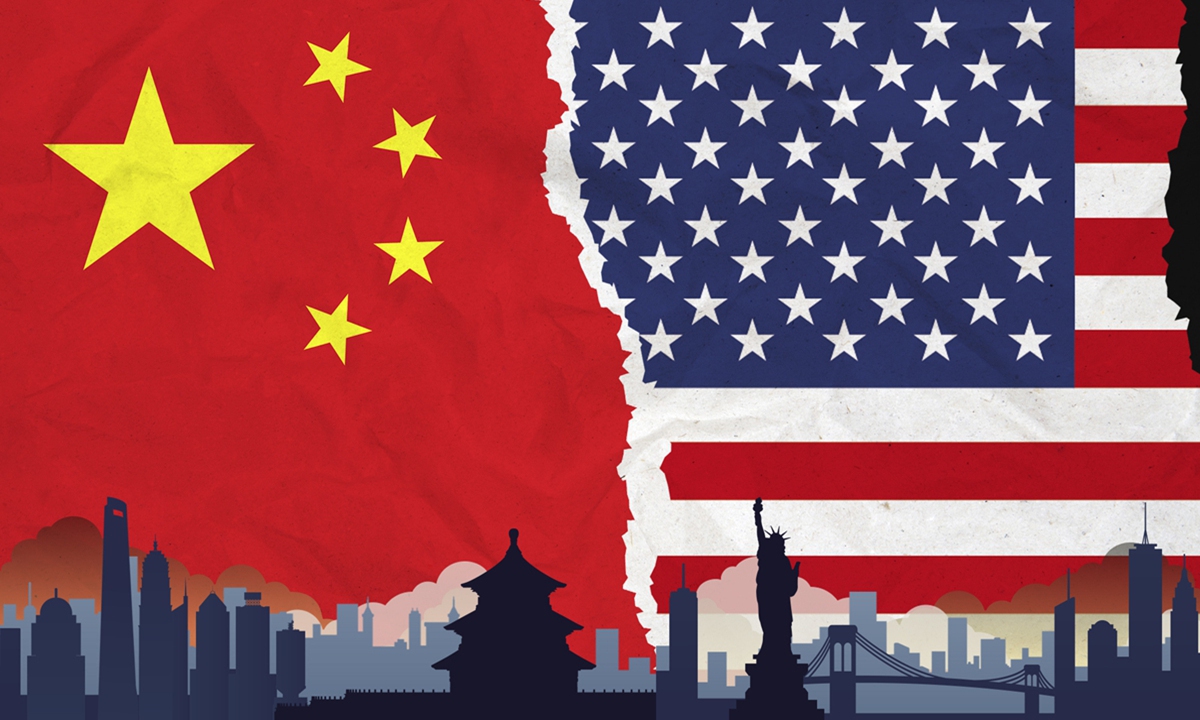
China-US Graphic: GT
Recently, there has been significant progress in the restoration of contact and dialogue between China and the US, as well as in managing the risks of conflict. However, we also regret to see an increase of the voices calling for a hardline stance toward China within the US. Both parties in the US are competing to manipulate the China issue, and the so-called "policy plans" to contain China that each party has put forward are becoming more and more absurd. Although some of these "plans" are not feasible and will not become reality, the damage to bilateral relations is real.
Although China and the US have different historical cultures, social systems, and development paths, many emotions are shared between the people of both countries. The book
Hillbilly Elegy by J.D. Vance, Donald Trump's vice-presidential running mate, has stirred sympathy in Chinese society for the "Rust Belt" of America. However, at the same time, there are some misconceptions about China in American society. China and the US should have a correct understanding of each other. Making an issue of China for election purposes is a disregard and hijacking of the huge common interests between China and the US. For US presidential candidates, it accumulates a deficit in the development of relations with China for the next US government. This approach seriously undermines the atmosphere of bilateral cooperation, and is also not conducive to world peace and stability.
China will never seek hegemony, has no intention to change America, nor does it have any interest in interfering in US elections. It also opposes the US constantly bringing up China in discussions. Creating an atmosphere of "fearmongering" toward China in the US won't help solve US problems, but will make things worse. Raising or promising to raise tariffs on Chinese goods has been seen as a "life-saving straw" by US presidential candidates to win voters, with both parties engaging in a "bidding war" on the issue of tariffs on China. Linking the rescue of American manufacturing to China is a serious misguidance of the American people. For example, the lack of competitiveness in the manufacturing industry in the "Rust Belt" of America is due to factors such as labor, land costs, and technological updates. Relying solely on raising tariffs will not enhance the competitiveness and efficiency of the manufacturing industry, but will only result in American businesses and consumers bearing the burden of tariff costs, further disrupting the normal operation of international production and supply chains.
The current consensus narrative among American politicians from both parties is to blame various domestic problems on economic globalization and the so-called "unfair competition" from China, with the aim of shifting attention and attempting to "cure internal diseases by external means." Targeting China, setting up trade barriers, and even staging a show of "comprehensive confrontation" with China to rekindle the "American spirit" can only be self-deception. Joseph Nye, a famous American political scientist, wrote an article this year specifically discussing the "sense of decline" among Americans, mentioning that anxiety about decline leads to protectionist policies that do more harm than good. Former White House Communications Director Anthony Scaramucci also called for the US to calm itself down a little bit on its China policy.
In fact, China has always been committed to expanding positive aspects of the China-US relationship that benefit both countries and their people. China is trying to cooperate with the US as much as possible and provide assistance over issues like fentanyl, which cause deep pain for the American people, especially the youth. Unfortunately, China's goodwill and efforts have been intentionally distorted and diluted by some in the US, with China's restraints seen as "compromises" and China's countermeasures portrayed as "threats." China, out of a sense of responsibility as a major country, strives to provide opportunities for win-win cooperation between the two countries as much as possible. However, it is not only often restricted and rejected, but also faces malicious slander and even suppression. Recently, American economist Stephen Roach mentioned that he has never seen in his adult lifetime an adversary that's been so vilified as the US is now vilifying the Chinese.
In terms of bilateral relations, China has full goodwill toward the US and hopes to resolve existing issues through cooperation. In the current situation, the common interests of the two countries have not decreased, but increased. The US needs to have a correct understanding of China, abide by its commitments to China, and both parties in the US should change the practice of using China as a scapegoat for domestic issues. After all, mutual respect, peaceful coexistence, and win-win cooperation are the only correct way for China and the US to get along.




